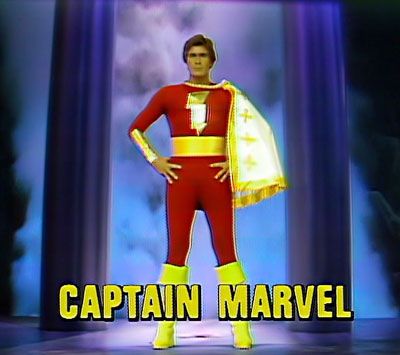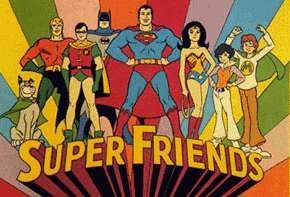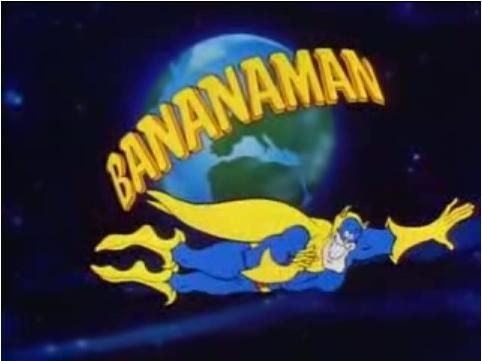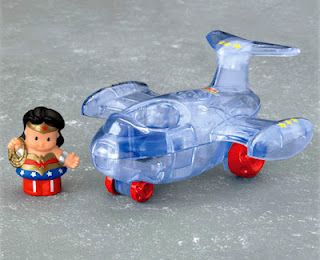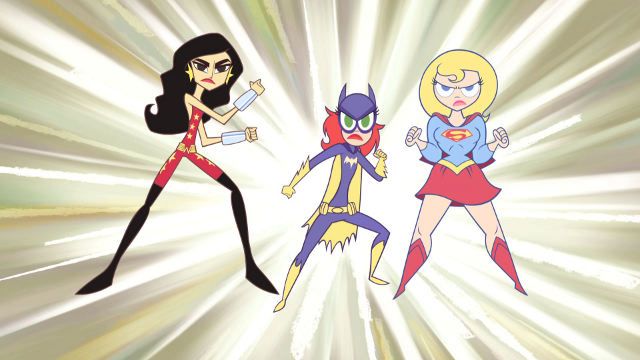On Saturday I went to a rather inappropriately fancy screening of the one-hour live action show Legends of the Super Heroes: The Challenge at the Paley Center in Beverly Hills. I'm a huge fan of the incongruous lauding of trashy pop culture that seems to be prevalent in Los Angeles and this did not disappoint. Part of an exhibition of the Warner Archive Collection, this low-budget Hanna-Barbera production was introduced by actor Garret Craig, who played Captain Marvel, who I should note was pretty clear that what we were about to see was as ridiculous to film as it was to watch. Amongst the other stars of the show were the original TV Batman; Adam West, his customary Robin; Burt Ward, as well as their familiar foe; Frank Gorshin as the Riddler. That was pretty much as far as it went in terms of recognizable faces, and although the piece had a sort of earnest joy about it, it was wonderfully terrible.
The story is that a team of mismatched super villians attempt to destroy the world from a secret hideout, then they let the super heroes know about it and give them a series of hints as to where to find them. I'm not sure why they would, but this is what they were doing.
Adults in spandex wasn't considered a ridiculous enough premise, so a meager attempt at comedy was injected. No story or plot to speak of, but wacky, super-low budget adventures (I mean low, low budget. You know, worse than the cosplayers we see at local comic conventions. Much worse. It seems like the writers were strongly influenced by the Hanna-Barbera cartoon - Super Friends (or Challenge of the Super Friends), which is possibly the most ill-advised influence a writer ever chose. I'm not slamming the Super Friends cartoon, since for the time it was made it wasn't that bad, but I am saying that the simplistic dialogue and vague attempts at plot did not translate to a live action show. The men wore uncomfortably visible sports cups, an afro-adorned Huntress seemed only to have the power of wearing pink, and although Black Canary had her scream, her extremely low-cut top was more disturbing. For some reason Hawkman's wings were clearly made of fur, and Robin was looking positively middle-aged. It was all pretty hysterical and that was before they started moving around and talking. The entirely random grouping of characters, both good and evil, the nonsensical settings, the clunky dialogue, and of course the worryingly bad effects (what there was of them) all colluded to create this excellently kitschy experience.
Campy, silly, funny... these aren't adjectives that I want to associate with my super hero fiction now, but these are exactly the things that I loved about American super hero cartoons when I was under 10 years old. I loved the ridiculous hyperbole, couldn't get enough of it.
Not having grown up in America, I have missed a lot of the American superhero cartoons that were on television. I think the closest we ever came was something called Banana Man - a 1980's send up of superheroes, Banana Man was (of course) quite hopeless. He did however instill a strong belief in the healthy properties of bananas, much like spinach did for Popeye. Later came Dangermouse, another ridiculous character, with the delusional qualities of mice like Pinky and the Brain (well the Brain), just a decade before the Animaniacs existed. For me these self-aware British parody heroes were a pale shadow of the happily blustering bravado of the simple American superheroes so dominant on American Tv in the '70's and '80's. Visiting America every year or so I ought to have more memories of the family I was ostensibly visiting, but all I can really remember are the truly awesome toy commercials and cartoons, mysteriously energetic and upbeat. British children's superhero fodder (what little there was of it on TV) was more in the arena of overtly lampooning the superhero, while the American school of humor appears to have veered more into the arena of straight slapstick. I have to wonder how this affects the British attitude to superheroes and the trappings of overt displays of power. Perhaps this is why the British comic book writers are so adept at dismantling the genre. Maybe it is my own visits across the pond which influenced my early love of those bold, bright, flamboyant superheroes.
It wasn't just fun to spend part of my evening watching Legends of the Super Heroes on a big screen, but it felt good to take the trip back to a different time when I used to eat up any tiny bit of American superhero and villain interplay that I could find. It was a healthy reminder of why adults love the genre so much - because we were brainwashed! From infancy we were spoon fed these fantastic characters in a simplified form. Even if it isn't what I watch anymore, I'm glad I got to see it again because it reminded me that I have a responsibility to the kids around me to share the love. With that in mind, today I sent my 3 year old cousin the Fisher Price Wonder Woman Invisible Jet and the first season of Justice League cartoon. The cartoon could be a little old for her, but it is a good quality cartoon with a great representation of some of my favorite DC superheroes working together. I would have liked to have sent her the DC feature length Wonder Woman cartoon that came out a couple of years ago, but with the gore and double entendre jokes, it felt inappropriate to buy for someone else's child.
The mini-shopping trip made me wonder why there isn't an ongoing comic book and cartoon for all-ages about Wonder Woman. On a larger level, it made me realize that almost every book in the "new" line of DC comics is for mature readers only, particularly the ones about women. In the past I've personally enjoyed both the MAX version and the regular versions of titles. It was interesting to see what different writers were able to do with the characters and more or less restrictions. I think there ought to be something similar for a popular female superhero, like Wonder Woman. I'm not talking about something aimed at little tiny kids (like the excellent Tiny Titans), just something for all-ages which is fairly action-packed, but relatively gore and sex free. DC have talked explicitly about channeling their energy into catering to an existing readership of aging adult men, but what about the next generation of super hero fans? How are we supposed to build a wider audience? I checked out the four Super Best Friends Forever shorts, (part of the DC Nation Shorts on Cartoon Network) and they seem like a good start. Maybe a little young for the kind of all-ages appeal we need to build a future audience of zealots, but at least they aren't brooding about their significant others or splattering the screen with blood.

